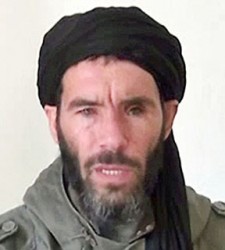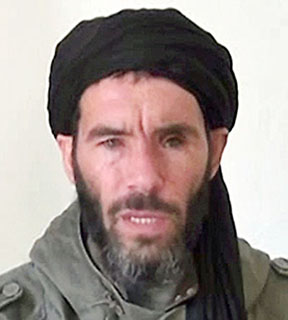TRIPOLI/WASHINGTON, (Reuters) – A veteran Islamist militant blamed for masterminding an Algerian gas field attack and running smuggling routes across North Africa, has been killed in a U.S. air strike inside Libya, Libya’s recognised government said on Sunday.

The government said the strike had killed Mokhtar Belmokhtar, an Algerian militant who became a major figure in insurgencies across North Africa and the Sahel and had earned the nickname the “Uncatchable” from the French military.
The U.S. military confirmed Belmokhtar had been targeted in the air strike on Saturday night, but did not say if he had been killed.
“I can confirm that the target of last night’s counterterrorism strike in Libya was Mokhtar Belmokhtar,” Pentagon spokesman Colonel Steve Warren said in a statement.
“The strike was carried out by U.S. aircraft,” Warren added.
“We are continuing to assess the results of the operation and will provide more details as appropriate.”
The Pentagon had said earlier on Sunday it had carried out a strike against an al Qaeda-affiliated target in Libya, but did not elaborate.
Following the initial U.S. statement, Libya’s recognised government said: “The Libyan government in the east of Libya confirms that U.S fighter jets conducted air strikes last night in a mission which resulted in the death of the terrorist Belmokhtar.”
Belmokhtar has been reported killed several times, including in 2013 when he was believed to have died in fighting in Mali. He has earned a reputation as one of the most elusive jihadi leaders in the region.
If confirmed, the death of Belmokhtar – who was blamed for orchestrating the 2013 attack on Algeria’s In Amenas gas field in which 40 oil workers died, and for several foreign kidnappings – would be a major strike against al Qaeda-tied groups in the region.
Once associated with al Qaeda in the Islamic Maghreb’s Algerian leadership, Belmokhtar broke from the group but remained tied to al Qaeda’s central leadership even after forming his own group “Those who sign in Blood”.
The one-eyed veteran of Afghanistan and Algeria’s own 1990s Islamist war had long been a major figure in Saharan smuggling, hostage-taking, arms trafficking and insurgencies, including the conflict in Mali.
Linked to a string of kidnappings of foreigners in North Africa in the past decade, Belmokhtar, who was born in Algeria in 1972, earned a reputation as one of the most important “gangster-jihadists” of the Sahara.
He also gained prominence as a supplier of arms to Islamist groups and as a trafficker of cigarettes, which gained him the nickname “Mister Marlboro” among the local population in the Sahara.
“He’s one of the best-known warlords of the Sahara,” said Stephen Ellis, an expert on organised crime and professor at the African Studies Centre in Leiden, the Netherlands.
Since the fall of Muammar Gaddafi in 2011 and Libya’s slide into chaos and fighting between two rival governments, the North African state has seen the rise of Islamist militant groups, which have taken advantage of the turmoil.
Some are allied with al Qaeda’s leadership, others have local loyalties and some have recently declared allegiance with Islamic State, which has been gaining ground.
Libyan officials gave no further details about the area of the strike. But before the U.S. statement, Libyan military sources said an air strike on Saturday in Ajdabiya city near Benghazi had killed seven members of the Ansar al Sharia militant group.
One Ajdabiya resident said people had seen what appeared to be an air strike much more accurate than ones carried out by local forces.

